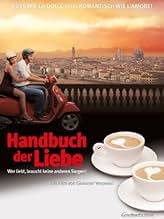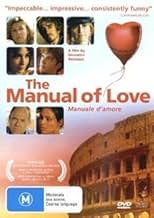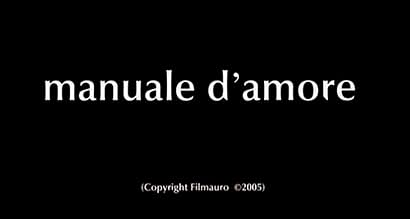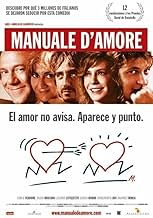NOTE IMDb
6,3/10
5,4 k
MA NOTE
Ajouter une intrigue dans votre langueFour intertwined episodes on the joys and sorrows of love.Four intertwined episodes on the joys and sorrows of love.Four intertwined episodes on the joys and sorrows of love.
- Réalisation
- Scénario
- Casting principal
- Récompenses
- 10 victoires et 21 nominations au total
Avis à la une
Saw this film during a class, it's surprise to see Carlo Verdone and Silvio Muccino again, last time I saw them together in "Il Mio Miglior Nemico" (2006), so I guess both are marquee actors in Italy (actually Carlo Verdone is a director too and the cast includes a dozen of the most famous Italian contemporary actors/actresses).
Actually I heard of this series before, the "Manuela D' Amore 2" also has become a huge success in Italy (with Monica Bellucci, a current sexy symbol of Italy), and rumor says the 3rd installment will invite Robert De Niro to join a star-studded cast, which shows its ambition to conquer a more international terrain.
The film has been a successful domestic box-office bomb in 2005 and also met with mainly positive feedbacks. It consists of four stories of love, from "falling in love", "the crisis", "the betrayal" to "the abandoned", four different sets of protagonists interpret their own chapter with a previous one educes a latter story and finally the fourth chapter encircles with the first one to make everything looks so perfect.
It is an innocuous comedic film with predictable farce and generally it is quite enjoyable. Although each chapter seems nothing particularly outstanding (when we talk about love, I think we have already seen ALMOST everything on screen), the advantage is that with four different stories altogether and each lasts for only 30 mins, the film shrewdly changes to a new chapter as soon as the previous one shows a sign of burning out, which at least will not annoy the audience (critics are not included).
The film got 10 nomination of David di Donatell Awards (Italian Oscar) and won several of them (including Best Supporting Actor and Actress, Carlo Verdone and Margherita Buy), which cruelly shows the truth that now we are in a world starving for great comedies, it is not only in Italy, but the whole earth as well.
Actually I heard of this series before, the "Manuela D' Amore 2" also has become a huge success in Italy (with Monica Bellucci, a current sexy symbol of Italy), and rumor says the 3rd installment will invite Robert De Niro to join a star-studded cast, which shows its ambition to conquer a more international terrain.
The film has been a successful domestic box-office bomb in 2005 and also met with mainly positive feedbacks. It consists of four stories of love, from "falling in love", "the crisis", "the betrayal" to "the abandoned", four different sets of protagonists interpret their own chapter with a previous one educes a latter story and finally the fourth chapter encircles with the first one to make everything looks so perfect.
It is an innocuous comedic film with predictable farce and generally it is quite enjoyable. Although each chapter seems nothing particularly outstanding (when we talk about love, I think we have already seen ALMOST everything on screen), the advantage is that with four different stories altogether and each lasts for only 30 mins, the film shrewdly changes to a new chapter as soon as the previous one shows a sign of burning out, which at least will not annoy the audience (critics are not included).
The film got 10 nomination of David di Donatell Awards (Italian Oscar) and won several of them (including Best Supporting Actor and Actress, Carlo Verdone and Margherita Buy), which cruelly shows the truth that now we are in a world starving for great comedies, it is not only in Italy, but the whole earth as well.
Considering that Italian comedy is kind of limited to 2 or 3 movies during the Christmas holidays,and that some of them are quite good (the ones with Leonardo Pieraccioni and Aldo,Giovanni & Giacomo)and some aren't (the Boldi & De Sica-movies),Manuale d'Amore was a bit of a surprise: released in March 2005,with a quite unknown director(Giovanni Veronesi,better known as a screenwriter,who was also behind Che Ne Sarà di Noi),a famous cast although only two actors were professional comedians (Carlo Verdone and Luciana Littizzetto),and a 4 episode-plot,reminiscent of classic Italian comedies,as well as Verdone's early films.
The story is simple but interesting,as it shows 4 different phases of love: 1.Tommaso (Silvio Muccino) falls desperately in love with Giulia (Jasmine Trinca)and spends the rest of the episode trying to get her; 2.Marco (Sergio Rubini) and Barbara (Margherita Buy) are a married couple in the middle of a crisis,and the whole situation is made funnier by the fact that the two actors were married in real life; 3.Ornella (Luciana Littizzetto) finds out that her husband is unfaithful and swears revenge; 4.Goffredo (Carlo Verdone)is suddenly left by his wife and tries to go on with his life,which won't be easy.
Veronesi tells the story in a very classic way (there are even characters commenting the events straight to camera),without using too much bad language (typical of the mediocre Christmas comedies)or any scenes of graphic nudity.
The cast is excellent: Muccino is one step closer to the stardom he deserves,Trinca,Buy and Rubini should do more comedies,while Littizzetto should do more movies. The real surprise,however,is Verdone,whose mature portrayal of an abandoned husband is miles away from his early,sketch-originated characters.His episode is a perfect mix of comedy and drama,and he deserved every bit of the David di Donatello he won for his performance(Best Actor in a Supporting Role).
So,if you want to watch a good Italian comedy,Manuale d'Amore is recommended.
The story is simple but interesting,as it shows 4 different phases of love: 1.Tommaso (Silvio Muccino) falls desperately in love with Giulia (Jasmine Trinca)and spends the rest of the episode trying to get her; 2.Marco (Sergio Rubini) and Barbara (Margherita Buy) are a married couple in the middle of a crisis,and the whole situation is made funnier by the fact that the two actors were married in real life; 3.Ornella (Luciana Littizzetto) finds out that her husband is unfaithful and swears revenge; 4.Goffredo (Carlo Verdone)is suddenly left by his wife and tries to go on with his life,which won't be easy.
Veronesi tells the story in a very classic way (there are even characters commenting the events straight to camera),without using too much bad language (typical of the mediocre Christmas comedies)or any scenes of graphic nudity.
The cast is excellent: Muccino is one step closer to the stardom he deserves,Trinca,Buy and Rubini should do more comedies,while Littizzetto should do more movies. The real surprise,however,is Verdone,whose mature portrayal of an abandoned husband is miles away from his early,sketch-originated characters.His episode is a perfect mix of comedy and drama,and he deserved every bit of the David di Donatello he won for his performance(Best Actor in a Supporting Role).
So,if you want to watch a good Italian comedy,Manuale d'Amore is recommended.
the funniest scenes are in the second story when the couple having difficulties go to visit relatives who have a new baby. The admiration the baby receives is so exaggerated, the disgust . . . well no point in spoiling it. Most of the audience when I went were young Mexicans who were identifying with the characters in the first story but I didn't get hooked until the second one. The problems with parking guards who give fines, arrange for cars to be hauled off etc was probably funnier to the Italian audience but traveled well across the border. The "moral" of the last story was one I wish I'd learned sooner. All in all a very enjoyable evening's entertainment.
Interesting
Exciting introduction My rating for the movie is ten out of ten, and an exciting introduction. Follow it. I advise you not to miss it. It is truly extremely enjoyable It is very interesting and has many events. Follow it, grab your favorite drink and enjoy If you have time and are looking for a movie, don't miss it. This is a great piece of advice. Go in and watch it, don't hesitate. After: Exciting My rating for the movie is ten out of ten, and an exciting introduction. Follow it. I advise you not to miss it. It is truly extremely enjoyable It is very interesting and has many events. Follow it, grab your favorite drink and enjoy If you have time and are looking for a movie, don't miss it. This is a great piece of advice. Go in and watch it, don't hesitate.
A flaw that I feared before watching this movie was stereotypes about love, like men playing tricks on women to conquer them or betrayals with best friends. As a matter of fact the movie is divided into various parts, each one describing a stage of love: falling in love, crisis, betrayal and abandon. The different mini-stories are tied with each other by characters who are somehow related and the end of the movie connects with the beginning as an ideal circle. Despite the same old stories about relationships and developments of love stories, this movie has anyway some good aspects. For example, each actor plays his own repertoire, displaying their qualities in what they do best and for what they're known for. The best sketches, in my opinion,are made by Goffredo, played by Carlo Verdone, and Marco, played by Sergio Rubini, who offer the sense of humor shown in their own movies.
Le saviez-vous
- AnecdotesToutes les informations contiennent des spoilers
- ConnexionsFollowed by Manuale d'amore 2 (Capitoli successivi) (2007)
Meilleurs choix
Connectez-vous pour évaluer et suivre la liste de favoris afin de recevoir des recommandations personnalisées
- How long is Manual of Love?Alimenté par Alexa
Détails
Box-office
- Montant brut mondial
- 22 281 609 $US
- Durée
- 1h 56min(116 min)
- Couleur
- Mixage
- Rapport de forme
- 1.85 : 1
Contribuer à cette page
Suggérer une modification ou ajouter du contenu manquant


























